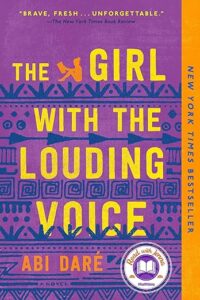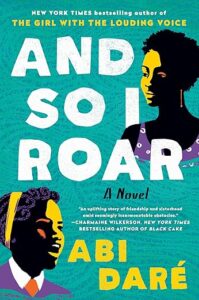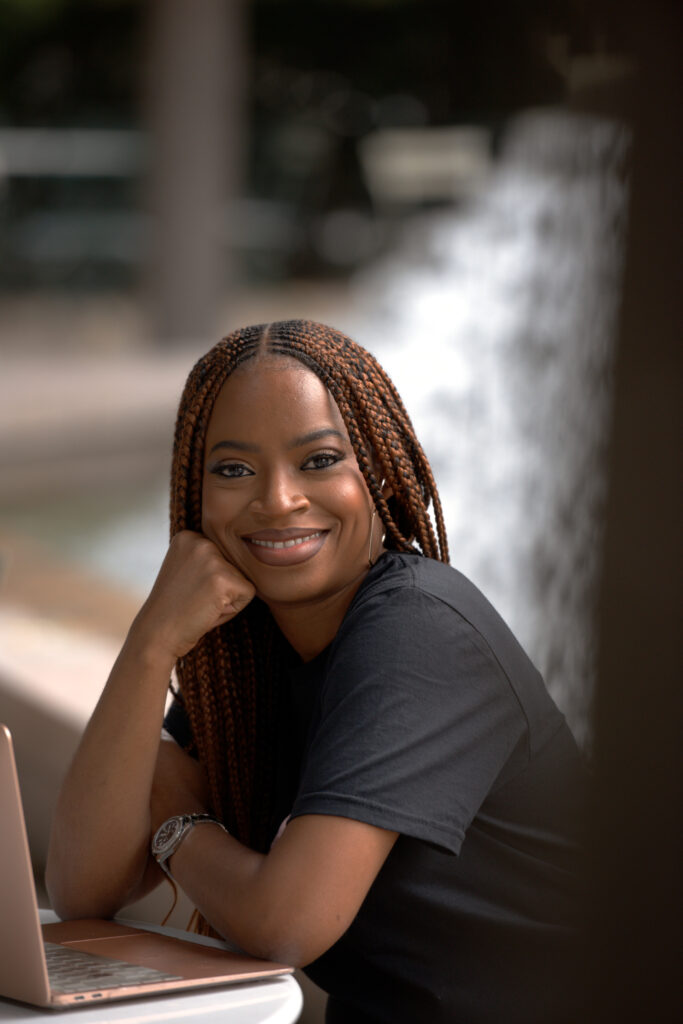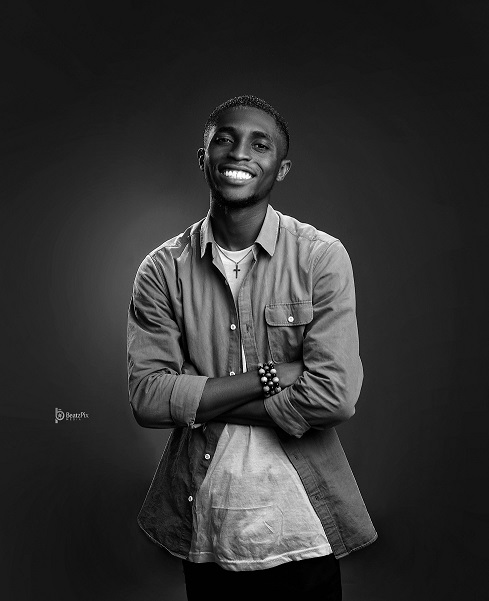Abi Daré found her stories in her Essex home. She had asked her daughter to do some chores, but the eight-year-old muttered her frustration. “Do you know that there are young girls like you who are working for families like ours in Nigeria?” she said to the girl. Weeks later, she couldn’t stop thinking about her response, and so she sat to write about it. She created Adunni, the teenage heroine of her debut novel The Girl with the Louding Voice and its sequel And So I Roar.
In the first book, Adunni is enslaved after the death of her mother but earns her freedom. In the second, she has a bigger demon to fight, but she finds company in another woman on her own journey of self-discovery. The duology’s portrayal of limited education, poverty, child-marriage, feminism, class, and exploitation won it readers. The Girl with the Louding Voice became a New York Times bestseller, a Read with Jenna Today Show Book Club choice, a BBC Radio 4 Book at Bedtime pick, and a finalist for the Desmond Elliott Prize. In a blurb, Imbolo Mbue called it “a celebration of girls who dare to dream.”

“I’ve always believed in the power of claiming your voice, especially in spaces that try to silence you,” said the novelist, who started writing as a child growing up in Lagos. She used to share her fiction on a blog and later edited her church magazine. She got a law degree from the University of Wolverhampton, an MSc in International Project Management from Glasgow Caledonian University, and an MA in creative writing from Birkbeck University of London. She was 34 when her first novel came out.
Her experiences, though, differ from those of her characters. “I don’t think you must have lived something exactly to write it; you must be willing to do the work to understand it.” Her own work includes being an External Board Member at BiC Corporate Foundation, an organization that supports educational initiatives that unlock potential and drive innovation, especially those focused on children and youths.
In the Q&A below, Daré shares her creative process, from research to character development, as well as the challenges of building on a successful first book, and the significance of setting her stories in Nigeria.

What was your first encounter with literature, and how did you become a writer?
My earliest memories are of tearing through Enid Blyton books, convinced that I’d join the Famous Five or go to a Malory Towers-type boarding school. But A Time to Kill by John Grisham was the first book that made me think, “Whoa, words can be powerful.” From there, the idea of writing my own stories slowly began to take root.
The title of your book, The Girl with the Louding Voice, reflects Adunni’s dream of having a loud voice and standing her ground as a woman. How does this resonate with you as a writer, and does And So I Roar hold a similar significance?
Absolutely! Adunni’s “louding voice” is about finding the courage to speak up and creating real, lasting impact — a journey that resonates deeply with me. I’ve always believed in the power of claiming your voice, especially in spaces that try to silence you.
With And So I Roar, it feels like the next evolution of that theme — not just speaking but truly owning your voice and channelling it toward positive and lasting change. It’s Adunni’s spirit taken to new heights: the move from finding a voice to using it boldly, unapologetically, and purposefully.
I understand that it was your mom who requested a sequel. Was it easier or harder to expand on an already existing world?
Yes, she did, but writing And So I Roar was a different beast. Building on Adunni’s world wasn’t easy, mainly because I wanted this new story to feel fresh but connected. And yes, shifting to multiple points of view and a new voice was a challenge — it felt like learning a new rhythm and learning to explore that familiar world from new angles.
Your novels explore poverty, exploitation, feminism, and class. How did you get these subjects right, especially coming from a different background?
It’s a mix of empathy, curiosity, and a lot of research. Even though my experiences are different, these issues feel very real to me. I talked to people, read personal accounts, and ensured I honoured their experiences as authentically as possible. I don’t think you must have lived something exactly to write it; you must be willing to do the work to understand it and write a story with dignity, respect, and as authentically as possible.
You’ve been in the UK for over twenty-four years, but your books are set in Nigeria. Is that a conscious choice?
Setting my stories in Nigeria grounds my work in a world of layered complexities — poverty, resilience, community, and aspiration — revealing the stark contrasts within my homeland: privilege versus struggle, education versus lack. Living in the UK gives me intimacy and distance, allowing me to capture Nigeria’s vibrant nuances with fresh eyes. In these first novels, I wanted to explore Nigeria through characters like Adunni, who confront and challenge their circumstances in deeply personal ways.
When you had that conversation with your daughter that inspired the novel, did you think about young boys in similar situations?
When I started Adunni’s story, I was struck by the staggering reality that about 129 million girls worldwide are out of school, with millions more in child labour — and in Nigeria alone, roughly 15 million children are engaged in child labour. Most of these young girls end up in domestic work, just like Adunni, with so many working as maids from an early age. That reality shaped my focus on Adunni’s character.
While I know boys face similar struggles, this story needed to focus on the unique challenges girls face in these roles, especially regarding education, identity, and voice. The challenges are vast for both boys and girls, and their stories each deserve attention in different ways. Adunni’s story is just one part of that bigger picture.
What about your research process interests you?
I love the surprises that research brings. You think you know something, and then you dig deeper and realize there’s so much more complexity. I often discover things that change how I approach a character or scene. It can be a fun rabbit hole — one article leads to a conversation, which leads to a new insight, and suddenly, a whole storyline clicks into place.
You finished the first draft of The Girl with the Louding Voice in eight months. How long did it take you to finish the first draft of And So I Roar?
And So I Roar took longer — about a year and a half or so. And this was after I had spent a couple of years trying to decide if this was the story I wanted to tell. This book required a different pace because I wanted to layer in those multiple perspectives and let the story breathe. It was much more challenging to write. ♦
If you love what you just read, please consider making a PayPal donation to enable us to publish more like it.
Buy Abi Daré’s books. Open Country Mag may earn an affiliate commission.
More In-depth Stories from Open Country Mag
— Momtaza Mehri’s Fluid Somali Diasporas
— Why Tobi Eyinade Built Rovingheights, Nigeria’s Biggest Bookstore
— Remy Ngamije on Doek! and the New Age of Namibian Literature
— Ebenezer Agu on 20.35 Africa and Curating New Poetry
— In Writing Cameroonian American Experiences, Nana Nkweti Crosses Genres
— The Cheeky Natives Is Letlhogonolo Mogkoroane and Alma-Nalisha Cele‘s Archive of Intentionality
— Cheswayo Mphanza on Intertextual Poetry and Zambia’s Moment
— Keletso Mopai Owns Her Story and Her Voice
— Troy Onyango on Lolwe and Literary Magazine Publishing in Africa
— At Africa in Dialogue, Gaamangwe Joy Mogami Lures Out Storytelling Truths
— Khadija Abdalla Bajaber on Fantasy and the Character of Kenyan Writing





